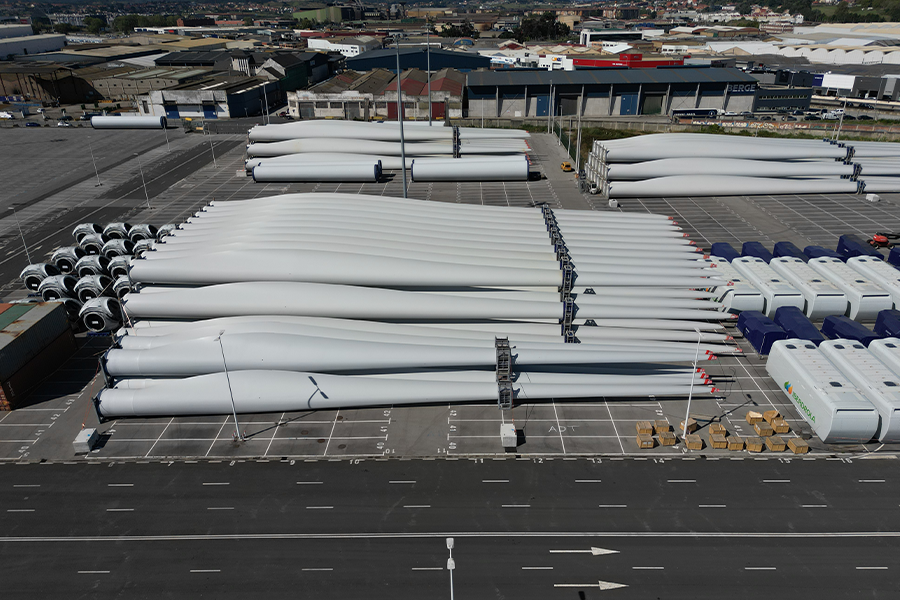Iberdrola España receives approval for El Escudo wind farm construction in Cantabria
-
The renewable project − through the company Biocantaber − has an investment of €120 million and will reach an output of 101 MW through 24 wind turbines that will be installed outside the wind energy exclusion zone
-
It is the first facility in Spain to use BIM technology to control the impact of the works

The El Escudo wind farm has been given the green light to continue with the preliminary construction work that began a few days ago for installing the renewable infrastructure, after the developer Biocantaber − in which Iberdrola España has a stake − obtained the building permit to begin construction.
The facility, which will have a capacity of 101 MW, will generate renewable energy equivalent to the annual consumption of 95,300 households and avoid the emission of 45,000 tonnes of CO2 annually.
Preliminary construction work has already begun, with Prior Administrative Authorisation (AAP by its Spanish acronym), in accordance with regulations. Work on the wind farm will begin with the internal access roads, as well as the foundations for the future power line and the levelling of the land on which the substation that will collect the renewable energy produced by the wind will be built.
It is also the first farm in Spain to apply BIM (Building Information Modeling) technology, a methodology that allows detailed control of the execution of works and, among other aspects, the application of measures to reduce the impact. This digital model is being developed by the Cantabrian company INGECID, linked to the Santander School of Civil Engineering.
The municipalities of Molledo, Luena and Campoo de Yuso will house 23 of the 24 wind turbines planned, as well as the wind farm's electrical substation. In the three municipalities mentioned above, the corresponding BP (building permits) are in place, and the only remaining wind turbine will be installed in the municipality of Aguayo.
The project has an investment of €120 million. A significant part of the construction budget is committed to local companies and will have an impact on employment of up to 200 jobs during peak periods. Thus, the wind farm develops a broad value chain between local companies in various fields such as civil works, electrical engineering, logistics, maintenance, security and telecommunications, as well as professionals who are responsible for supervising the work to avoid impacts on nature or heritage.
Likewise, the company has been fulfilling its support measures for the local community since before the works began. In this regard, for the second year running, the company has paid for English lessons and extra support lessons for the children of Campoo de Yuso. In addition, once the wind farm is in operation, the local residents will benefit from the best electricity tariff conditions in Spain, as well as a series of other measures to promote quality of life and economic activity to halt depopulation in these rural areas.
Rigorous administrative process
The project has had the Environmental Impact Statement (DIA by its Spanish acronym) since May 2021 and the Prior Administrative Authorisation (AAP) since May 2022. The Regional Commission for Territorial and Urban Planning (CROTU by its Spanish acronym) authorised the construction of the Escudo Wind Farm in October 2023.
It should be noted that in the Environmental Impact Statement process, 8 wind turbines were subtracted from the total of the initial project and that they could be authorised after 5 years − after assessing the wind project's coexistence with biodiversity − following the corresponding administrative process.
Likewise, during the administrative process for the building permit, a wind turbine was removed, which could be recovered once an archaeological survey has been carried out and the results obtained show that there is no effect on the archaeological site of Mediajo Frío. In this case, the corresponding administrative process would also be carried out.
On the other hand, the TSJC has refused to halt the drilling, a case that has subsequently been shelved, given that the geological surveys carried out have been positive. The TSJM has also refused to halt the project twice: against the Platform for the Defence of the Cantabrian Mountains and the Platform for the Defence of Southern Cantabria.
The project has also obtained the Authorisation of Roads and River Basin Confederation, the Authorisation of Biodiversity and the Authorisation of Cultural Heritage, and has been granted the Use of Public Utility Mountains by the Government Council and the Administrative Concession by Mountains and Biodiversity.
